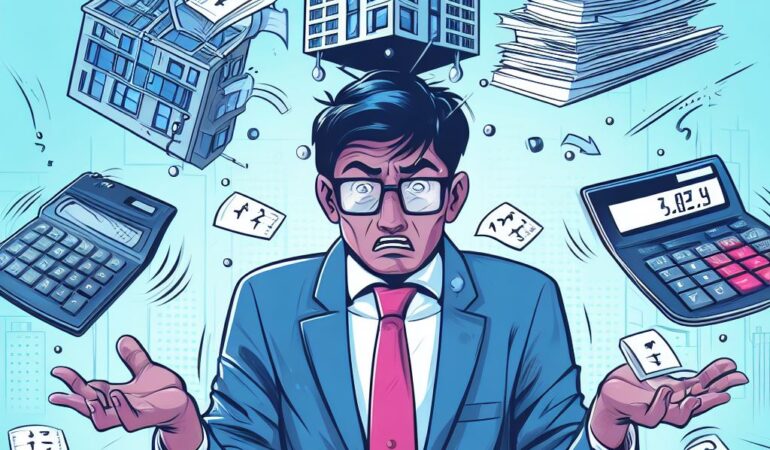You might be wondering why so many people make mistakes when it comes to property valuation for a 1031 exchange. Well, let’s break it down.
Lack of market research, overestimating property value, ignoring property condition, failing to consider location factors, and not seeking professional assistance are all common pitfalls.
In this article, we’ll delve into each of these areas, providing a detailed and objective analysis to help you avoid these costly errors.
Key Takeaways
- Lack of thorough market research can lead to mistakes in property valuation for a 1031 exchange.
- Ignoring property condition can result in inaccurate valuations and financial losses.
- Failing to consider location factors significantly impacts property value and potential for growth.
- Not seeking professional assistance can lead to penalties and additional expenses.
Lack of Market Research
If you fail to conduct thorough market research, you can easily make mistakes in property valuation for a 1031 exchange. Market research plays a crucial role in determining the value of a property and ensuring that you make informed decisions during a 1031 exchange. By neglecting to gather and analyze relevant market data, you may end up over or underestimating the value of the property, leading to potential financial losses.
Thorough market research involves studying various factors that can influence property values, such as location, demographics, economic trends, and market demand. It requires analyzing comparable properties, recent sales data, and market trends to accurately assess the fair market value of the property you intend to exchange.
Without conducting proper market research, you may rely on inaccurate or outdated information, resulting in an incorrect valuation. This can lead to overpaying for a property, which reduces the potential tax benefits of a 1031 exchange. Alternatively, undervaluing a property may result in a higher tax liability or missed opportunities for finding better investment options.
To avoid these mistakes, it’s crucial to dedicate sufficient time and effort to conducting thorough market research. This will provide you with the necessary data and insights to make well-informed decisions and maximize the benefits of a 1031 exchange.
Overestimating Property Value
When overestimating the value of a property during a 1031 exchange, you risk making costly mistakes that can negatively impact your financial outcomes. It’s crucial to accurately assess the value of the property to ensure a successful exchange. Here are some reasons why people tend to overestimate property value:
- Emotional attachment: Emotions can cloud judgment and lead to an inflated perception of a property’s worth.
- Lack of expertise: Without proper knowledge and experience in property valuation, it’s easy to overestimate its value.
- Insufficient market research: Failing to conduct thorough market research can result in unrealistic expectations and overestimation.
- Ignoring comparable sales: Comparing the subject property to similar properties that have recently sold can provide valuable insights into its true value.
- Overemphasis on improvements: While improvements can increase a property’s value, overestimating their impact can lead to inflated valuations.
To avoid overestimating the value of a property, it’s crucial to approach the valuation process with objectivity and rely on accurate market data. Seeking the assistance of a professional appraiser or real estate agent can also help ensure a more accurate assessment. Remember, a realistic valuation is essential for a successful 1031 exchange and maximizing your financial gains.
Ignoring Property Condition
Have you ever overlooked the importance of assessing the property condition during a 1031 exchange? Ignoring the property condition is a common mistake made by individuals engaging in a 1031 exchange.
When valuing a property for this type of exchange, it’s crucial to consider its current condition, as it can greatly impact its value and potential for future growth.
Failing to evaluate the property’s condition can lead to inaccurate valuations and ultimately, financial losses. A property in poor condition may require significant repairs or renovations, which can incur additional costs. These costs should be factored into the valuation to ensure an accurate assessment of the property’s worth.
Additionally, ignoring the property condition can affect the property’s income potential. A property that’s in disrepair or in need of maintenance may not attract tenants or may require lower rental rates. This can negatively impact the property’s cash flow and overall value.
To avoid this mistake, it’s essential to thoroughly inspect the property and assess its condition before finalizing a 1031 exchange. Consider hiring a professional inspector or contractor to provide an unbiased evaluation. By doing so, you can make a more informed decision and ensure that the property’s condition is accurately reflected in its valuation.
Failing to Consider Location Factors
Don’t overlook the importance of considering location factors when valuing a property for a 1031 exchange. The location of a property can significantly impact its value and potential for future growth. Ignoring these factors can lead to costly mistakes and missed opportunities.
Here are five location factors that shouldn’t be ignored:
- Neighborhood: The quality of the neighborhood can greatly influence property value. Consider factors such as safety, schools, amenities, and proximity to transportation.
- Economic Growth: Look at the economic growth potential of the area. Is it a thriving job market with a diverse range of industries? A strong economy can drive demand for property and increase its value over time.
- Market Trends: Study market trends in the area. Are property values increasing or decreasing? Understanding the local market can help you make informed decisions and avoid overpaying for a property.
- Accessibility: Consider the accessibility of the property. Is it conveniently located near major highways, airports, and public transportation? Easy access can attract tenants and increase the property’s desirability.
- Future Development: Research any planned or ongoing developments in the area. New infrastructure, commercial projects, or zoning changes can have a significant impact on property values.
Not Seeking Professional Assistance
To avoid potential pitfalls, it is crucial to enlist the help of a qualified professional when valuing a property for a 1031 exchange. Not seeking professional assistance can lead to costly mistakes and missed opportunities. A qualified professional can provide valuable expertise and guidance throughout the valuation process.
Here are some reasons why not seeking professional assistance can be problematic:
| Reason | Impact |
|---|---|
| Lack of expertise | Without the knowledge and experience of a professional, you may not accurately assess the value of the property. This can result in overpaying or undervaluing the property, leading to financial losses. |
| Inadequate market analysis | Professionals have access to comprehensive market data and can conduct thorough market analysis. Without this information, you may not fully understand the current market conditions and trends, potentially leading to poor investment decisions. |
| Legal and tax implications | 1031 exchanges have specific legal and tax requirements. Failing to comply with these regulations can result in penalties and additional expenses. Professionals can ensure that you meet all necessary legal and tax obligations.
Frequently Asked Questions
Can You Provide Examples of Market Research Methods That Can Help in Accurately Valuing a Property for a 1031 Exchange?
To accurately value a property for a 1031 exchange, you can use market research methods such as comparable sales analysis, income approach, and cost approach. These methods provide objective data for a thorough evaluation.
What Are Some Common Factors That Can Lead to Overestimating the Value of a Property in a 1031 Exchange?
Common factors that can lead to overestimating property value in a 1031 exchange include emotional attachment, lack of market knowledge, and relying solely on outdated or inaccurate data. Avoid these pitfalls to ensure an accurate valuation.
Are There Any Specific Property Condition Issues That Are Commonly Overlooked During Property Valuation for a 1031 Exchange?
During property valuation for a 1031 exchange, people commonly overlook specific property condition issues. These issues can include structural damage, plumbing or electrical problems, and environmental hazards, all of which can lead to inaccurate valuations.
Could You Explain the Importance of Considering Location Factors When Valuing a Property for a 1031 Exchange?
Considering location factors is crucial when valuing a property for a 1031 exchange. It determines the property’s desirability, potential growth, and market demand. Ignoring these factors can lead to inaccurate valuations and potentially costly mistakes.
How Can Seeking Professional Assistance, Such as Hiring a Real Estate Appraiser or Tax Advisor, Help in Avoiding Mistakes During Property Valuation for a 1031 Exchange?
Seeking professional assistance, like hiring a real estate appraiser or tax advisor, can help you avoid mistakes during property valuation for a 1031 exchange. They have the expertise to accurately assess the value and guide you through the process.




